Something about a trip to the water helps remind you of how life is always just a little better when things are not perfectly balanced. To a student of physics this may come as something of a shock, when realized at first. After all some of the greatest beauty in the truth revealed through that way of knowing relies on a fundamental assumption of balance. Consider Newton’s famous Third Law (sometimes inaccurately quoted as to “every action there is an equal and opposite reaction”) which, simply stated is “If Object A applies a force on Object B then B applies a force on A equal in size but opposite in direction.” Push and there’s a push-back…sort of. Other things too: charge; find a positive and expect a corresponding negative. Even at the more fundamental level; find a particle, then look for a corresponding “antiparticle.” Find a “property” say something called, for example, “up,” and therefore expect it to be matched with a corresponding “down.” Chances are you’ll find it. If not then you expect that maybe something is wrong.
But not always. It depends on how you look at it.
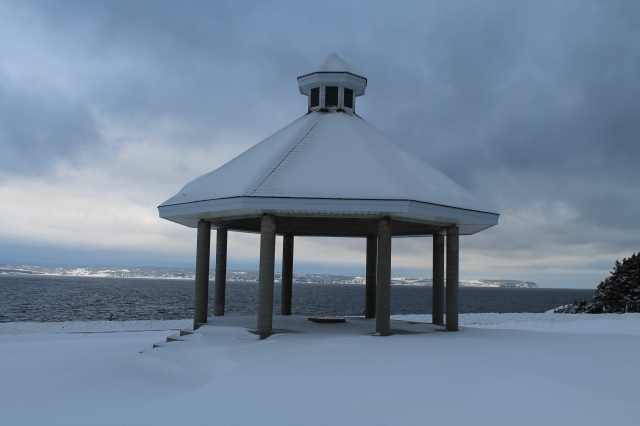
Bell Island from Topsail Beach.What to do: level the horizon, the foreground or the gazebo? Sometimes asymmetry is just a given.
When you think about it much of what happens in the physical world is all about asymmetry. Heat energy flows to where the temperature is lower. Thus, hot things cool off; maybe get cold. An unbalanced force acts on a rock and thrusts it upwards, seemingly defying that most asymmetric of forces: gravity itself.
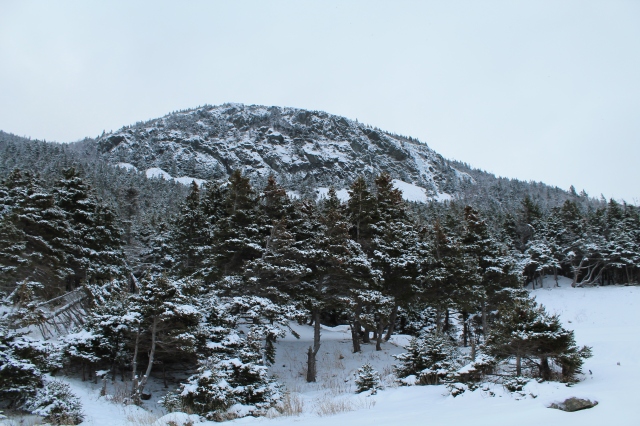
But not for long. All things do act as if to seek a lower energy state. Drop by drop the rain and the melting snow will follow gravity’s path to the ocean and thus grain by grain the hill will slowly be reduced; nature’s own regression to the mean as it were.
Bit by bit the Canada I love is tending toward a “lower state” too. Just last week it was finally shown for sure that my country’s spy agencies have decided to turn their sights on those of us they are supposed to serve. They say it’s to protect our safety. Safety above all! The price will be some loss of freedom. They go on to insist that they were not really snooping on us at all, merely looking at the metadata; the data-about-data (phone numbers, IP addresses, owners’ identities, persons contacted, locations, times) as if that’s not much. Did you look at the list in parentheses? The Cold War era CIA, Stasi and KGB could not do as well on “combatants” could they? Potential threats to safety–is that what we are all to be considered…at least in theory?
Sometimes the greatest beauty is to be found when we drop symmetry altogether and just let things interact. Land and sea. What is it about the contrast that draws us to it?
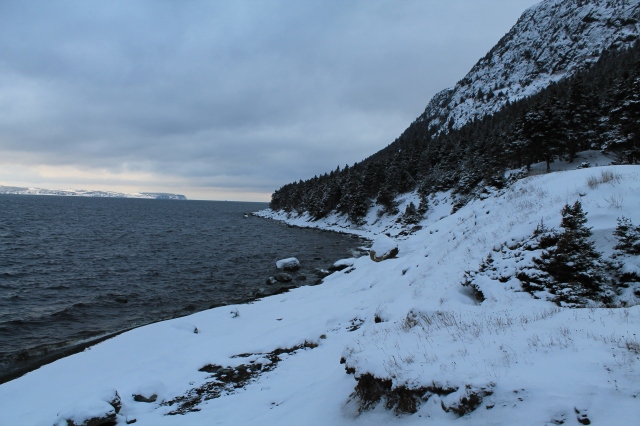
Perhaps there, at the interface between wet and dry, high and low, that we realize the best of what we have to offer is not to be found in straightforward, internally consistent models, based as they are on ideals, assumptions and constraints that, taken together result in something of only limited predictive value. Introduce just one unknown, one element of chaos to the model and what becomes of its usefulness?
And besides, who wants a nice, neat trouble-free world? The sight of the birds, making a winter’s life there in the semi-frozen estuary, more or less oblivious to the pretty, well-kept human homes behind them reminds me of a bit I heard in a talk by the great Buddhist Master Thích Nhất Hạnh when he spoke of the traditional ideal of what many refer to as “heaven.” In short, he simply cannot imagine as worthwhile a place and time where people have nothing better to do than just play it safe and take it easy all of the time. To him the whole value in life comes from the endless struggle faced as we seek improvement in not just our own lives but, more importantly, those of others.

Is that what we are expected to do–just give up and welcome in the police/surveillance state blindly accepting that it will keep us safe? Safe for what? To unquestioningly go about our business day after day, focused only on the work needed to make the money for the monthly payments on the over-built house we do not need or the toys that sit most of the time in our driveway? And what do we do when CSIS decides that the metadata is not enough? In the interest of safety it now needs to be able to access the content we are viewing, hear the calls we are making, read our mail and messages. Trust us–we’re the government, after all.
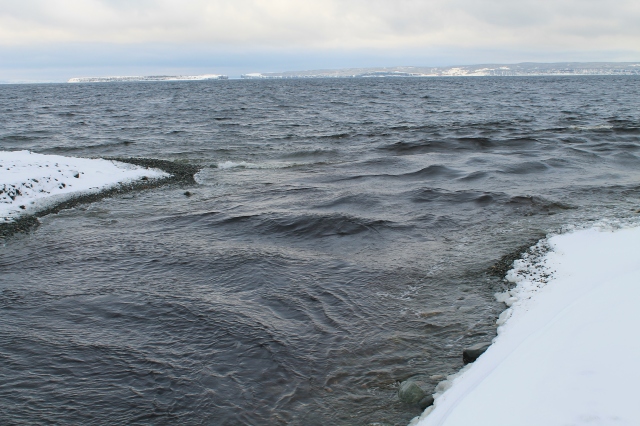
An opening, perhaps? A place in which that fundamental imbalance is expected; a welcome sight to some, unwelcome to others. It depends on what you want. Looking to see if we can find a positive change or intent on keeping things as they are, lest they worsen.
But perhaps also a call for humility and for patience. That which seems immobile will, with time become smoother, smaller, perhaps even disappear. All it takes is the ability to sustain that unbalanced force.
It’s cliché. The innocent protagonist is on the run from a much more powerful adversary; one with eyes and operatives everywhere. They just need to get to the one entity they can trust. Then along it comes, the big black SUV. A door opens and one of the several agents inside says, “Get in now!.” “Why?” asks the protagonist. The reply, always, “It’s for your safety! But get in now before it’s too late!”
And, sitting there, the audience, every single onlooker who can see what’s going on, screams inwardly, “Don’t get in the car! Do not, under any circumstance give up your freedom!”
“It’s for your safety,” that oft-used but wickedly effective line. If there something that you know that nobody will do either acting on instinct or after thinking it through, this is one of the really effective ways you have of getting the outcome you want. When told their safety is at risk people will do things they should not and will give up things they know they should not.
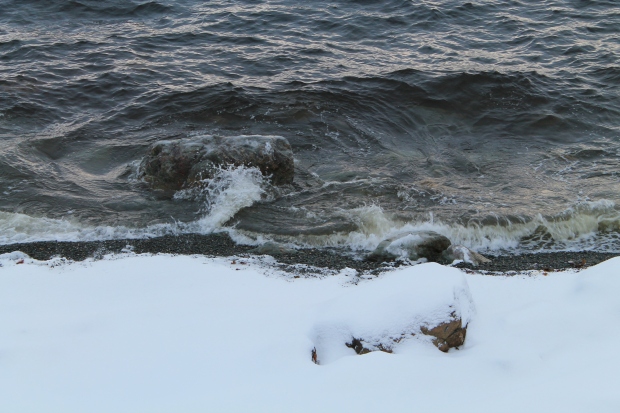
And what of the future. Those who never take the time to look beneath the surface, to “unpack it all” as the phrase often goes in academic circles, still labour under the assumption that we seek is fundamental truth. Where did it actually begin? What’s it really like at the most basic level? Maybe what we are really wondering is, “How did it get to be like this?”
What, in the end, do these spy agencies really want from us? Perhaps it’s best to imagine just who ends up working in that field. People with an inherent grasp of the flawed but essential goodness of most of humanity or people who believe that at the core of each and every human being lurks a potential villain, ready to unleash evil if the perfect storm of factors gets its way. The preferred resting state in their view, for all of us is, what? …a society where we only do what’s sanctioned and only free to do what’s expressly laid out but always under the vigilant watch of those who know that at all of our cores (except theirs) lurks a potential traitor?
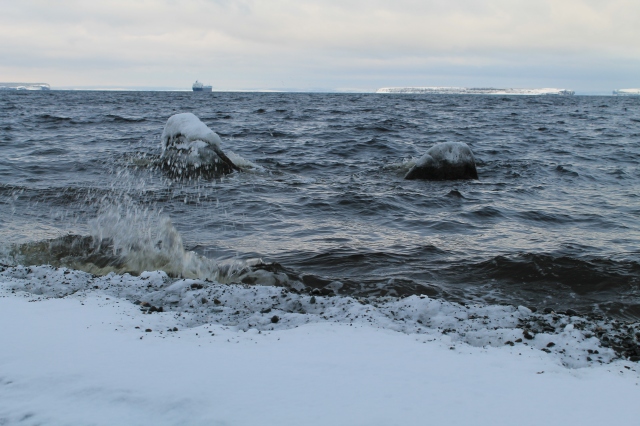
Even at the relatively warm temperature of -4 C the ice can form on the rock even though the sea water all around it freezes at a much lower temperature. The clues as to why, though, are clearly visible. You just have to know how to interpret them.
Isn’t it better to acknowledge that final truth will likely ever remain elusive? What is knowable, though, will change. Our eyes can only see what the light permits. Likewise the brain only interprets that which is knowable under its current state. That can change. Each new bit of knowledge brings, with it, the possibility of a re-scaffolding of our fundamental understanding whether it be the bit-by-bit construction that occurs daily or the “throw down that whole part; we have a better design here” type than happens every now and then.
But as for an end-game and a final great singularity of understanding, who cares? The journey is always worth it and, every so often we are afforded a grand view. Perhaps that’s enough.
Safety net or not with each step we take lies the possibility of danger. That’s a given. Do I have something to hide? No, that’s not the point; the real concern here is a lack of limits, rules and policies for the self-appointed watchers. Learning to recognize threat in its many forms and, then, learning wise and effective responses is a part of life’s journey. In the end we must all share in the responsibility for, not only our own safety but also, the safety of those with whom we share our lives. Knowing real from imagined danger is part of it all. That’s why we have two thinking systems. One that evokes the flight-or fight response in milliseconds when sensory input alerts us to imminent danger and one that encourages us to weigh the risks and benefits for those risks that transcend the here-and-now. Maybe we can decide that the risks posed by an omnipresent, unregulated surveillance system outweigh those from phantoms under the bed. At least we can decide together and not have the choices made for us, sight unseen, by those who, above all, fear and mistrust us.
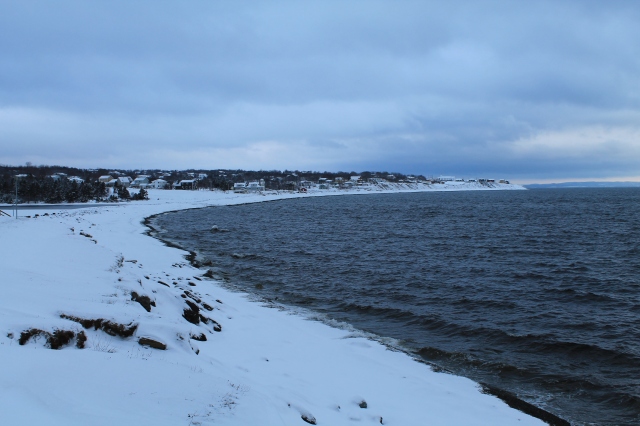
Best of all, when we turn around from that grand view the memory remains. That which we say cannot be unseen.
New light and new understanding reveals new details and, with them, come new questions. The cycle continues.

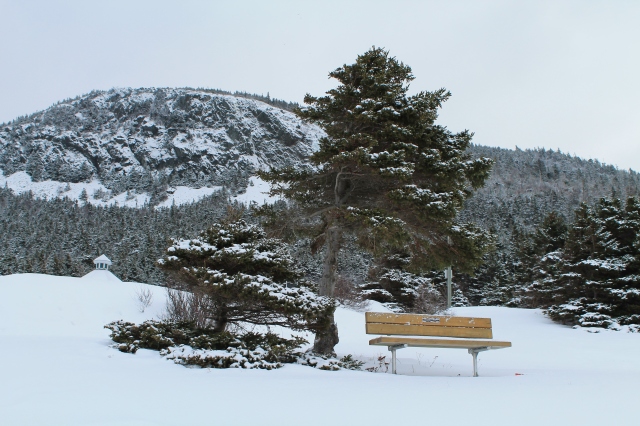
Spook-y. Goes without saying I don’t agree with it. How much time and effort goes into monitoring boring people who have no interest in terrorism or rebellion or anything remotely damaging to ‘the state’? 1984 arrived a long time ago. Terrorism played into the hands of all too eager governments to spy on people. And still miss half the terrorists.
Thought-provoking, worrying, and very nicely done with the parallels (I suppose asymmetry doesn’t have parallels) with our external environment. Very well illustrated with those chilly photos.
I am surprised at Canada joining in this though 😦
I blame it on two influences, both related to a neo-conservative, big oil business movement represented by current Prime Minister, Stephen Harper. He’s very much a conservative. He’s rebranded the “Government of Canada” as the “Harper Government” –seriously, how stupidly narcissistic can you get, and we are lazy and passive enough to put up with it–and has gone on to pursue an agenda driven primarily by his monied friends from the oil industry. As far as my province is concerned his policy has been to put the screws right to us as we REALLY do not approve of him at all down here. After all, in 2005 he came down here and bare-faced lied to us about extending custodial jurisdiction onto the nose and tail of the Grand Banks where the EU fleet is currently raping the shit out of our fish stocks. He did nothing at all except to give the EU more and more–and just let the pillaging continue. Wimpy Canada has caved to the EU fishing countries and lets them prosecute fisheries violations instead of us–it never happens of course. Just to give a figure, in one reporting period the EU was granted the ability to take 164,000 tonnes of our precious fish. They admitted themselves they took 880,000 T and our scientists figure that they misreported (fraud) the actual catch and the real take was 1.3 million tonnes! Christ that’s almost ten times what they were given!!!!! …and our allocations are generally based on pushing sustainability to the limit. Nothing, of course was done about it, except for the bribes, bribes and bribes that went from the EU fishers to business interests here who lobby and lobby effectively evidently. He took away our search and rescue capacity. US–NL is a seafaring place with no SAR!!!! He is closing down fisheries and environmental research. On and on.
In short he is trying to (a) deal away our precious natural resources in favour of concessions to his own interests and (b) curtail our access to information while, at the same time, giving the fed broad-sweeping powers to snoop on us
The second influence is the many failed and since abandoned policies from the US which, of course Harper and his cronies think and just fine even though the US realized long ago they were on the wrong track…
Harper wins elections by promising jobs. The people who need them vote for him and he gets in. The rest of Canada has either (A) grown so lazy, uncaring and complacent to resist or (B) is at hostage to the banks–scared and going to work each morning, to keep a fleet of toys just barely paid for in the garage and maintain that far-too-big home, that they don’t want to rock the boat.
Through all that, to hell with:
– the arts
– science
– culture
– and most of all, the environment
I am a proud Canadian and I love my country but, frankly, I do not love what the current Fed is doing to it. It’s twisted.
They’re watching us watching them watching… Big Brother is alive and well. While carrying an ID card wouldn’t bother me (what have I got to hide) the ease with which information can be assimilated without even much effort about an individual is already frightening. Factor in organised blanket surveillence and it all takes on a far more sinister tone.
The tones you have captured in your pictures here mirror the bleakness of your message – very clever juxtaposition. The subject matter however is, as always, pretty breathtaking.
Thanks. Yes this runs far too deep for comfort. All I can state is that if this has to be a surveillance state then let us act like an advanced democracy and hash out how much of this is tolerable.
You wrote: “Learning to recognize threat in its many forms and, then, learning wise and effective responses is a part of life’s journey.” Well said, and I agree.
And yes, government surveillance of a supposedly democratic and free population is a frightening problem. An equally frightening problem is the lack of concern of so many of that population. That obliviousness appears to me as a slothful lack of motivation and impetus to take the journey you’re describing, to learn, through experience and reflection, the wisdom to distinguish between authentic danger and contrived distraction.
Tracy you have nailed it and I really like the way you have put it. People don’t generally take power unless it is there for the taking. We are all far too passive and the few around with the intelligence, gumption and lack of morals and/or concern/respect for others are just taking far too many liberties with it. It’s soon time for the giant to awaken and do a little house cleaning. We need to take stock and set in place some limits.
We need inspired leadership! I think you should do it! 😉 (I’m only half-joking).
Beautiful photos – especially the one of Bell Island. Yes , Big Bro is alive and well and has so many more avenues to invade privacy than ever before – not only govts. but corporations collecting data –
Ah, yes, there’s another issue that bears mention. While some companies are at least trying to do this with a sense of respect for privacy, others–and Facebook comes to mind–just assume that privacy is dead and the information is just theirs for the taking. This amoral, selfish and childishl response will lead to no good for society.
I had not heard that our brothers and sisters to the North were stepping out on to that most slippery of slopes that we ourselves have negotiated, are negotiating, and are arguing about continuing to negotiate in the future. The way in which you have woven the issues of asymmetry and personal freedoms is going to require more time to unravel and make sense of in my own head. What I can say, however, is that the metaphoric use of asymmetry works for this most important issue. Perhaps what you need to do is to step back and widen your perspective. One of the many responsibilities of the Nation State is to protect. Not that I am in favor of carte blanche, NSA-style, data mining or other forms of electronic surveillance … but if we step back … if we tell ourselves that, perhaps, when personal freedom and personal protection are set in the balance, at this particular time in history, these sorts of infringements are necessary. To not allow them, and look back and say they may have been able to prevent one or another evil deed … would be unfortunate. Can we see this point in time as a blip? Can we assume the programs may be needed only temporarily? Will we be able to look back and say they were useful? I do not know. The asymmetries in all of these considerations abound. Thanks though for describing them so beautifully. D
Dave, you’ve hit it right on the head. In short we say that we live in advanced democracies. That means that we will devise thoughtful responses to issues both current and upcoming. Yes, it is a question of learning to put in place a process that achieves balance. On the one hand, national security and on the other hand, personal freedom. As I see it that often forgotten third arm of government–the judiciary–gets left out far too often. This, clearly, is a place where we need to expand that third arm as the number of judgements of what is acceptable and what is not is about to see a significant increase. Yes, sometimes snooping is necessary. To assume that nefarious forces are not active within our midst would be patently stupid, but to extend that same cloud of suspicion over everyone and assume a no-trust policy in all dealings is too high a price. So what we need is an efficient process that can quickly evaluate all requests to snoop and then render judgements–in a transparent way–in a manner that informs those who need to be informed while not impeding legitimate law enforcement and security. We need that conversation now and in the meantime we need to continue to expose all incursions that are patently unacceptable while we still have some freedom left and know what it feels like.
A very rich and multi-layered post again – and as usal it trigger some chains of thoughts that are hard to turn into a coherend short comment.
As for these meta-data and signal-tracking I recall that retailers have considered (…announced? I can’t remember…) that they would follow signals in order to learn about customers moving through the aisles in order to optimize product placement. I am not sure if that commercial use – and related misuse – is scarier than governmental spying.
I would also like to see numbers of such data collected by spying versus collected because users sign up for location based services or because they don’t turn off Google’s or Facebook’s related last update.
What I worry about most is not so much the collection of raw data (Have fun with Petabytes of Wi-Fi metadata!) but the assumptions and prejudices that will be built into the algorithms analyzing such data…. and trying to find patterns in randomness where thre are none. I must admit I am not that concerned about the NSA spying on my data on a US cloud server as about an intellectual property violation hunting algorithm run by that cloud provider running wild and suspending my account because one of my files meets some characteristics of pirated stuff accidentally.
Absolutely correct. At least governments are “supposed” to be acting in the best interests of society as a whole and are working for some sort of balance, however misguided. Most commercial interests are purely profit driven and tend to be more-or-less amoral in other regards. Who knows what they’ll do with the (yes, agreed, it’s mostly useless) data. No good will come to the individuals in question, that’s for sure.
Now as to your last bit. That’s an interesting point of view–one that I had note even considered at all (ha ha, and once again I am reminded of why I appreciate your writings). I was mainly thinking of the misuse of stuff that is personally private. Of course the stuff that is “professionally” private is every bit as important. How on earth can small and medium business expect to hold a competitive advantage under that sort of onslaught? It is doubly concerning for sure. Encryption is the first thing that comes to mind but research (work related) that I conducted over the last few weeks has shown for sure that most of the current methods are ineffective as:
1. encryption as a service on cloud based servers is essentially useless as the provider holds the key. Most, under NSA request, providers not only turn over the data but also the encryption key.
2. Snowden provided evidence that the NSA has maintained the ability to use brute strength methods to break encryption methods anyway, even if they don’t possess the key.
3. Even if you use persistent end-to-end encryption it also may fail as the NSA has coerced many of the developers to provide back-door access, thus circumventing the whole process.
Now, the NSA and its equivalents are bad enough but it gets worse. The fact is that if a legal entity can do it then criminal organizations–which have no rules or limits whatsoever–can do the same but even easier. Think about it. A well funded organization just coerces an individual within a security firm, cloud server unit or developer of encryption methods to just provide keys or a back door. WOW–think of the money you could make with that ability! Just try catching THOSE crooks.
This is depressing.
It’s hard to resist commenting with a wall-of-text now – but it is a good opportunity to warm up for my upcoming post on security. On principle I agree with you but from my – probably anecdotal – experience I’d like to set different priorities. I never worked with the military but with companies from all industry sectors.
I have spent countless hours discussing rather academic attacks on algorithms and governmental spying etc. (before this was a hot topic in the media) with “corporate security officers” and other experts – all people whose job it was to “audit” and “define policies” but who were not the ones who had to run the systems and make them somewhat usable by end users. I’d like to say tongue-in-cheek that I am an anti-security-consultant siding with IT Operations – the poor guys who actually have to go through painful recovery processes for encrypted stuff, applying procedures and policies that are hardly used on a daily basis and thus never trained.
I would not believe it hadn’t I experienced it so often – even in very large corporations with dedicated stuff for running “security systems”: Introducing features that raise the security level close to what the paranoid guys want makes it nearly unmanageable for typical IT admin departments (let alone end users). I could fill a book with anedcotes wouldn’t I be bound by NDAs. Any “security incident” I was ever requested to help with was about admins locking themselves out of systems or having lost documentation how to run that intricate prodecure once in 5 years. I don’t deny that hacking is a risk but from pragmatic risk management perspective (turning losses into dollars) the harm done by overly secure systems is very real and can be much bigger.
Peter Gutmann – a computer scientist who utters his critique of security features in an irreverent way and with whom I am in total agreement – suggests that “policy guys” should be forced to write out every single step involved in setting up e-mail encryption… then they would realize why SMIME never was a smash hit with users (and IT departments).
As far as I followed the reports on Snowden’s documents he did not state firmly that specific algorithms, say AES256, have been backdoored. But for the sake of the argument let’s assume it is. There are online backup systems who – I believe – don’t count as “cloud” from marketing peoples’ perspectives are they are too painful to use. These systems do encrypt data symmetrically with a key supplied by the user, locally at the user’s workstation (in addition to encrypting these encrypted data in transit using SSL). AES256 is common here and on principle a startup could come up with a system using an even newer algorithm. I would argue this lowers the risk considerably but the downside is: There is no backup – if the user loses the key, he/she lost access to the data. And every privacy-aware user I know (with the exception of hardcore geeks – but these are the minority those “security officers” tend to forget that) would like to call some kind of helpdesk to help with recovery of the key or the data. This also accounts for top managers who are on the one hand sometimes extremely paranoid about system admins sniffing their data, but on the other hand they expect 24/7 VIP support including of course data recovery.
So my point is that in order to reach “NSA proof security” you have to put reliability of systems at risk or make operations extremely expensive. Or it is just that all those hype about NSA spying triggers the contrarian in me.
Elke, this is actually a reply to the next thread. I have limited the number of thread depths for readability but, unfortunately, it limits discussion. Design constraints 🙂
I really like the point you just raised in that reply, though as, once again, it is one that I had not considered at all, even though I have found myself, like you, frustrated by exactly the problem you just stated–breaches and lockouts caused by nothing other than what I would term “casual negligence” the act of forgetting something VERY important … but knowing that most people would do the same under much the same circumstances.
I have two responses:
1–As a former civil servant I have become used to exercising extreme caution on how I handle information. Every thing that comes past me now, unconsciously, undergoes a threat analysis while I scan for potential Personally Identifiable Information (I’ll say PIN from now on) as well as stuff that is otherwise confidential or even sensitive. We have all had to take it to extremes: no email attachments containing that stuff, all secure connections and NOTHING of the kind downloaded on local drives (if possible–threes always the browser cache). BUT–like you said it is all a PAIN and I know ful well that (a) a lot of valuable time is lost conforming to these regs; time better spent in processing “stuff” and making decisions; stuff we are paid for and (b) many people, after doing their own risk analysis decide, foolishly, not to follow the guidelines. From time to time, these folks and their choices lead them into real trouble–breaches–and the rest of us are then dumped on with increasingly stringent guidelines that those people who got us in trouble in the first place probably don’t follow anyway.
2–I am currently working on a long-term project that you might find interesting. I’m working with a software firm whose product and service is all about data obfuscation (or data masking as it is sometimes inaccurately described as). This industry is built around this premise: existing information systems need constant patches and upgrades and this can only be properly done when the people have access to real data; all of it. Of course that’s not something that can be allowed to happen. External agents simly cannot be given access to data that exists in large databases as it contains either (a) PIN or (b) trade secrets. So, the company I am working with has am interesting solution. They have tools and a process that finds the confidential and sensitive information in question and replaces it — irreversibly — with credible alternatives. New names, credible but false financial information, dates and locations and such. It is also consistent: if “Elke Stangl” is replaced with “Frida Helms” in the employee table in the personnel database then the system will also replace Elke with the same name if she is found, say, in the “next of kin” table of the same database and even if she shows up in a free form “notes” field of, say, the HelpDesk database. It is consistent and, above all, irreversible so that the PIN cannot be reassembled later. Of course this is for a special purpose–obfuscating data in non-production databases but at least it nicely solves one problem without having to resort to that pesky end-to-end encryption we are talking about.
Oh, and wall-of-test comments are always my favourite because they contain my favourite thing: depth.
Given Canada’s proximity to the second most paranoid society on earth I suppose this should not come as a total surprise but then I suppose many of us kind of hold Canada up as a model of how a ‘small’ (not physically of course) country can be less intrusive than some of the world’s larger states but this is obviously not true, sadly. Unfortunately it seems Big Brother works for the NSA and none of us is safe from the spies who only want to ‘protect us.’
The usual argument of course goes along the lines of we ‘re only doing for your own good – or is it ‘for our own good?’ I’m not involved in any nefarious activities per se but I know that the British security service in conjunction with their partners in the US monitor my activities online as I am an active participant in the Scottish independence debate.
I’m not worried that they might read something anti-British but that they may have the potential to rustle something up which may be impossible for me, as a normal, relatively non-techie person to disprove, should ‘the state’ decide that I have become someone they no longer desire in their ‘perfect society.’ Such intrusion must be resisted by everyone and I for one think that Mr Snowden is one of the few real heroes in this f987&/d up world. Thanks for bringing this to our attention Maurice.
Thanks Iain. As I see it the world always has its collection of paranoid types with god complexes and while they remind us to always keep an eye out for danger we should never leave them to their own devices (pun intended) as they will never know limits. To me the real discussion should start with how much of this is actually good and where the limits need to be. Once we have some agreement on that then we need to make sure that the rules are followed and that we don’t leave the door open for the paranoid types to take it too far–which is what they have done.
They have indeed. The question remains how can we undo it? It’s a bit like uninventing the bomb unfortunately. Bottles and genies spring to mind. Go offline and live in a cave I suppose!
I believe you are correct. What’s done is done and so the only response I can think of is legislation. It will happen no doubt but can we at least make it all a bit more transparent. We can’t stop it from happening but can we at least put rules in place?
Trouble is these people are no respecters of borders or boundaries. Hello cave! 😀
Thanks Maurice for a lovely post! You offered grand views where land and sea interact freely – and food for thought as well. I agree that the main problem is lack of limits, and lack of respect by the “watchers” where some limits may exist.
Thanks Tiny. Here’s my issue in a nutshell: I have no problem with things like search and seizure as I know that law enfornement really needs to do this from time to time. They also have guidelines. In particular, a third party wihth sound judgement and thorough understanding of the Law — a Judge — intervenes and decides whether the incursion is justified. The result, a warrant, is a public document so there are no secrets. I just wish a similar process and record for digital incursions and know that’s a reasonable request.
I fully agree.
I’d comment, but someone might be listening ….
🙂
LOL! I am sure they re, with interest. Hopefully they’ll learn something useful. 🙂
LOL! I am sure they re, with interest. Hopefully they’ll learn something useful. 🙂